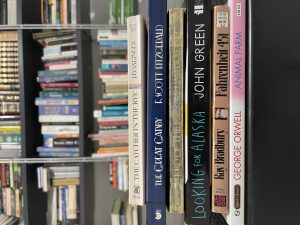Listening to music in class decreases productivity
January 2, 2020
What is to be done about the whopping 87 percent of students all across the nation who listen to music while studying, and those who go as far as to use ear-buds and headphones during school lessons and in-between classes?
It is hard to go a day at school without spotting an abundance of AirPods, ear-buds and headphones. One senior student named Taj quoted in an article on “Hey Teach” by Nancy Barile, Award-Winning Teacher, M.A.Ed., said, “When I write, I feel like music helps me concentrate deeply. It’s easy for me to put my words on paper.”
Students who believe listening to music while working is a good idea ignore the detrimental effects music can lead to. Despite the copious amounts of research and scientists that claim that listening to music while studying only serves as a distraction, a multitude of teenagers do it nonetheless.
Students in class tell their teachers that music helps them focus better and that it increases productivity. In fact, after conducting a brief study over the course of one week in school, it was found that in all seven classes it was possible to spot at least two students wearing AirPods during lessons.
It is imperative that students suspend the listening of music during class, and only use headphones or earbuds in the halls, if at all. Music is an awful companion to have while trying to work, and if it comes to doing quality work or focusing on the lyrics of a song, the song will always win.
The first step to creating a safer and more focused learning environment is to ban the use of AirPods in school. Not only are AirPods easily hidden under hair or a hood in class, but the surplus of them in school can be dangerous. “The AirPods’ specific absorption rate (SAR), which measures how much radiation is absorbed by the body, is 0.466 watts per kilogram. This is well below the legal limit of 1.60W/kg set by regulators in the US,” a New Zeland paper reported.
Although one pair of AirPods by themselves do not pose a great threat, the combined force of all the radiation emitted by the countless pairs of them in school is an unhealthy amount of radiation students are exposed to in schools. It should be clear that listening to music in school does not trump the health effects it causes.
The second step is for teachers to stop permitting students to listen to music during class. One scientific study found that “the louder the music, the worse the cognitive performance. Data from this study revealed, once again, that silence was the best environment to maximize performance when engaging in cognitive activity.”
If it is the teachers’ job to ensure a productive learning environment, then it is crucial that they eliminate one of the biggest distractors in the classroom: music.
In order to increase productivity, students must stop listening to music in the classroom and work in a quiet environment. How’s that “sound”?











